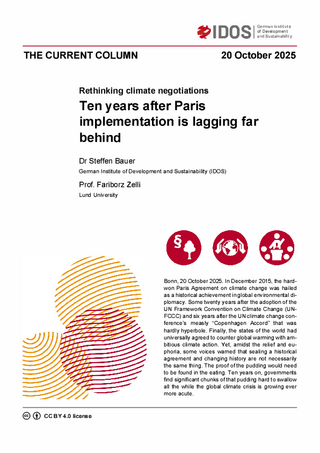Rethinking climate negotiations
Ten years after Paris implementation is lagging far behind
Bauer, Steffen / Fariborz ZelliThe Current Column (2025)
Bonn: German Institute of Development and Sustainability (IDOS), The Current Column of 20 October 2025
Bonn, 20 October 2025. In December 2015, the hard-won Paris Agreement on climate change was hailed as a historical achievement in global environmental diplomacy. Some twenty years after the adoption of the UN Framework Convention on Climate Change (UNFCCC) and six years after the UN climate change conference’s measly “Copenhagen Accord” that was hardly hyperbole. Finally, the states of the world had universally agreed to counter global warming with ambitious climate action. Yet, amidst the relief and euphoria, some voices warned that sealing a historical agreement and changing history are not necessarily the same thing. The proof of the pudding would need to be found in the eating. Ten years on, governments find significant chunks of that pudding hard to swallow all the while the global climate crisis is growing ever more acute.
Indeed, global climate governance – as represented by the annual UN climate change conferences (“COPs”) – is riddled with structural challenges that were always hard to overcome. In many ways the Paris Agreement is exemplary for an array of fundamental problems that plague global environmental diplomacy today. While negotiations may yield very ambitious goals that are consensually agreed and even ratified by most parties, these goals are voluntary and fail to specify the required contributions of each party.
Instead of including clearly attributed country obligations – as the Kyoto Protocol, the Paris Agreement’s precursor, did – each country is invited to come up with their own tailor-made targets and implementation plans. On the one hand, this redelegation of authority from the international to national levels was key to reach consensus around the Paris Agreement. On the other hand, achieving the agreement’s overarching objective – to halt global heating at 1.5°C relative to pre-industrial levels – now relies solely on nationally determined contributions (NDCs) that are defined unilaterally. These assume for every country to do what it can, but effectively lead every party to do what they want. Hence, during the first ‘Global Stocktake’ in late 2023 it was no surprise that the sum of NDCs rather added up to a projected global heating close to 3°C.
Much the same applies to the money that is needed to finance global climate policy: ambitious multilateral targets to mobilise billions are matched with unilateral funding pledges. Again, the figures are far from adding up. We find similar patterns of goal-setting versus implementation gaps for the Sustainable Development Goals and the Kunming-Montreal Global Biodiversity Targets. This led some observers to criticise ‘governance through goals’ as a paradigm shift towards symbolic politics in global sustainability governance.
Compounding these disappointments, UN climate change conferences have suffered from political rituals that have evolved over decades of negotiating. One of these is the “who-blinks-first” mentality of major negotiating blocks, the holding back of concessions on key issues until the last moments of any given COP. This approach leads to the often half-baked and typically dramatic late-night spree of discontented decisions, that have become characteristic for recent COPs. This trend is intensified by the “high-level segments” that are typically scheduled in the second week of COPs: ministers and even heads of state fly in to generate political momentum and to provide delegates with that extra dose of political authority. While this may serve to raise the profile and publicity of complex negotiations, the sheer presence of governmental leaders often creates a ”COP inside the COP” that tends to suck a lot of oxygen from ongoing critical work. Together with power games between asymmetric negotiating blocks, such rituals help explain why today’s COPs often get stuck in window-dressing deals.
A first step to break out of this path dependency towards more of the same symbolic politics could be to tackle the very rituals that divert attention from reaching deeper deals. A respective reform of UN climate change negotiations could complement the current COP layout with smaller, but more frequent and solution-oriented meetings. This approach could follow the example of iterative ‘resumed sessions’ as recently exercised by the UN biodiversity COP in 2024. Why not emulate this model to nudge the overblown climate COPs to more substantive outcomes?
Ongoing UN reform debates even open a window of opportunity for such restructuring as past experiences illustrate the benefits of more concise formats. Indeed, circumventing the cumbersome rituals of full-fledged COPs can discourage who-blinks first tactics and motivate more pragmatic talks instead. Also, iterative smaller sessions provide better occasions for convening informal groups with different compositions to facilitate trust-building, mutual learning and ownership. It should also help the COP to refocus on its essential governance functions, thereby guiding implementation rather than perpetuating archaic negotiation rituals. Not least, the regularity of such groundwork meetings should incentivise parties to demonstrate accountability in striving for the overarching objective to curb dangerous climate change.
Steffen Bauer is a political scientist and senior researcher in the research department Environmental Governance at the German Institute of Development and Sustainability (IDOS).
Fariborz Zelli is professor of political science at Lund University, Sweden, with a focus on global environmental politics and environmental justice.


